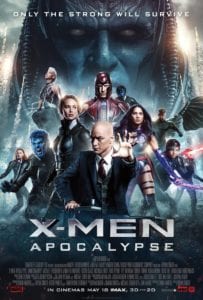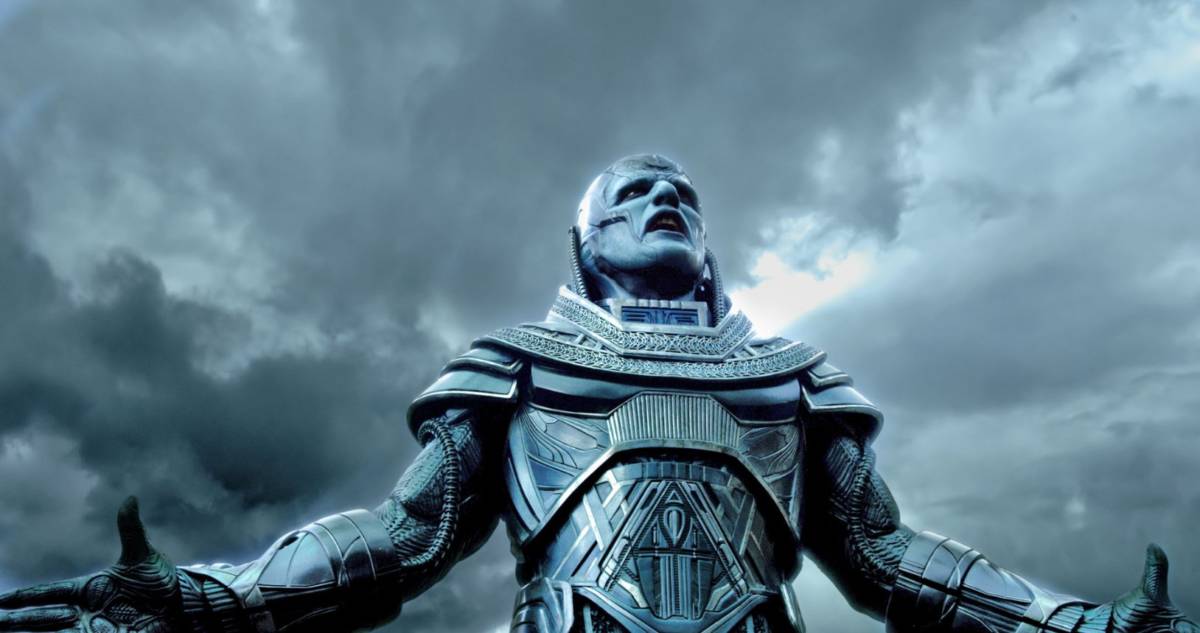Movie review: “X-Men: Apocalypse” (PG-13)
![]() Science fiction, fantasy, religion, and camp collide in “X-Men: Apocalypse,” the sixth chapter (the eighth, if you count the standalone “Wolverine” films) in a series based on the famed Marvel comics. Back to helm this “X-Men” entry for his fourth time is director Bryan Singer.
Science fiction, fantasy, religion, and camp collide in “X-Men: Apocalypse,” the sixth chapter (the eighth, if you count the standalone “Wolverine” films) in a series based on the famed Marvel comics. Back to helm this “X-Men” entry for his fourth time is director Bryan Singer.
In terms of the timeline, things tend to get overly complicated with the later films in the “X-Men” series. Singer directed the first two entries but sat the much maligned third picture out (that dubious honor went to filmmaking whipping boy Brett Ratner). A few years later, “Kick-Ass” director Matthew Vaughn would breathe new life into the series by going back into the past — the ’60s, to be precise — and reestablishing the timeline with “X-Men: First Class,” a movie that would creatively reintroduce us to the X-Men in their youth. Then Bryan Singer would come back into the fold with “Days of Future Past,” a mind-boggling superhero epic that would find various versions of our favorite X-Men from different timelines sharing the screen together. Much of the action in “Days of Future Past” took place in the ’70s. Everyone with me so far?
“X-Men: Apocalypse” uses that wonderful decade that was the ’80s as the primary backdrop. This film focuses on the rebirth of ancient supermutant En Sabah Nur, aka Apocalypse (Oscar Isaac), a powerful being born thousands of years in the past. Upon bearing witness to the modern world, Apocalypse doesn’t like what he sees, so he heads out on the road — that’s right, “Apocalypse” is essentially a mutant road movie — in an effort to round up a handful of the most powerful mutants on Earth, Magneto (Michael Fassbender) included. The goal is to take control of the planet from those pesky, violent, and weak worshippers of false gods known as the human race. All that stands between Apocalypse and world domination is Charles Xavier (James McAvoy) and his school for the gifted. Among said gifted: Mystique (Jennifer Lawrence), Jean Grey (Sophie Turner), Cyclops (Tye Sheridan), Beast (Nicholas Hoult), Nightcrawler (Kodi Smit-McPhee), Quicksilver (Evan Peters), and Havok (Lucas Till).
 I dig Bryan Singer’s storytelling skills. “The Usual Suspects” was arguably one the strongest films of the ’90s, and Singer certainly deserves props for helping usher in the superhero renaissance of the 2000s. The first “X-Men” not only introduced the world to Hugh Jackman (who may or may not have a cameo in this picture), it was also instrumental in allowing comic book properties to be taken seriously in a cinematic platform, predating both Sam Raimi’s astronomically popular “Spider-Man” and Christopher Nolan’s caped crusader reboot, “Batman Begins.”
I dig Bryan Singer’s storytelling skills. “The Usual Suspects” was arguably one the strongest films of the ’90s, and Singer certainly deserves props for helping usher in the superhero renaissance of the 2000s. The first “X-Men” not only introduced the world to Hugh Jackman (who may or may not have a cameo in this picture), it was also instrumental in allowing comic book properties to be taken seriously in a cinematic platform, predating both Sam Raimi’s astronomically popular “Spider-Man” and Christopher Nolan’s caped crusader reboot, “Batman Begins.”
Having said that, the convoluted (and inconsistent) “X-Men: Apocalypse” emerges as a disappointment. It’s more entertaining than “The Last Stand” to be sure, but in terms of overall entertainment value, I’d be hard pressed to put it in the same league as any of the other “X-Men” movies (not including the standalone “Wolverine” films). “Apocalypse” is certainly large in scope, and it might just offer up the largest number of effects shots in the entire series. But for a great deal of its running time it falls surprisingly flat.
There are fun sequences to be sure. Singer and crew attempt to one-up Quicksilver’s legendary “Days of Future Past” slow-mo rescue sequence by way of a bigger, more elaborate explosion set piece. While it’s a technical “marvel” to behold (see what I did there?), it’s simply more of the same and actually lacks the humor and element of surprise at the heart of the sequence that inspired it. In another of this picture’s more memorable lighthearted moments, the X-Men argue over which “Star Wars” film is best, leading to a direct potshot at “X-Men: The Last Stand.”
“Apocalypse” offers up other spirited moments. But despite the fact that this movie zips along rather briskly, it’s still surprisingly dull for much of it’s running time, and a great deal of the visual effects are oddly lackluster. More importantly, though, while “Apocalypse” works hard to incorporate all of your favorite X-Men, many of these characters are simply given nothing substantial to do.
The standouts in the cast are Fassbender as tortured mutant soul Eric Lehnsherr who, once again, strives to live in peace until pesky mankind forces him, once again, to retaliate. McAvoy does a slam-dunk Patrick Stewart impersonation as Charles Xavier, an idealist whose hope for world peace is only rivaled by his love for ex-flame Moira Mactaggert (Rose Byrne.) Fassbender and McAvoy are the only two actors in this picture who truly emote and rise above their seemingly campy surroundings. In fact, Fassbender is so good that I would have preferred a standalone movie about his life in the years between “Days of Future Past” and “Apocalypse.” Instead, we get an all too brief subplot that feels shoehorned into an overstuffed movie.
Admittedly, it’s a great deal of fun watching Isaac go from resistance savior Poe Dameron to godlike, world-pulverizing Apocalypse; but ultimately, this is a one-note character with very little complexity (watch as Apocalypse gets a crash course lesson in the ways of the modern world by way of television — actually, that explains a lot), and his overall makeup design is less than impressive. Isaac does bring a healthy dose of menace to the role, particularly in the finale, which plays like a dream sequence in a “Nightmare on Elm Street” movie. But in the end, Apocalypse isn’t nearly as memorable as one would hope. Props to Isaac for putting forth a valiant effort, though.
Jennifer Lawrence, one of the brightest stars of her generation, virtually sleepwalks through this thing. Her Mystique portends to have a larger role than she actually does, and it’s frustrating. Equally frustrating is the reintroduction of Jean Grey (Sophie Turner), an important character in the “X-Men” mythology whose power would lead to one of the most vital plot developments in the comic. Here, said plot development is so slight, that some audiences won’t even notice it. As played in “Apocalypse,” it’s more like an ill-conceived Easter egg.
As expected, this “X-Men” movie uses mutant lore as a timely metaphor for acceptance. The theme of family is also key in this universe, and in one throwaway subplot, this theme is half-explored, presumably so that the other half can be explored in the next “X-Men” movie. But here’s the thing: “Apocalypse,” while occasionally entertaining, is often so flat and so inconsistent with the rest of the series that it doesn’t really warrant another entry. And this is coming from someone who quite enjoys this franchise as a whole.
With it’s massive scope and jam-packed roster of heroes squaring off against each other, this Marvel property is closer to the “Batman v Superman: Dawn of Justice” side of things than the “Captain America: Civil War” side of things, meaning that if “Dawn of Justice” is your jam, you’ll probably enjoy this movie, too (for the record, I think I prefer “Apocalypse” to “Batman v Superman”).
Not that all of these superhero movies constantly need comparing. But sometimes it’s hard not to, particularly when there are so many similar traits on display. At the end of the day, “Civil War” is not without its problems, but that film offers up well-defined character arcs and real dramatic weight, and it’s a spirited movie that dares you not to be excited for the next chapter. The uneven “X-Men: Apocalypse” by comparison might lead one to hope that this series is coming to an end.







